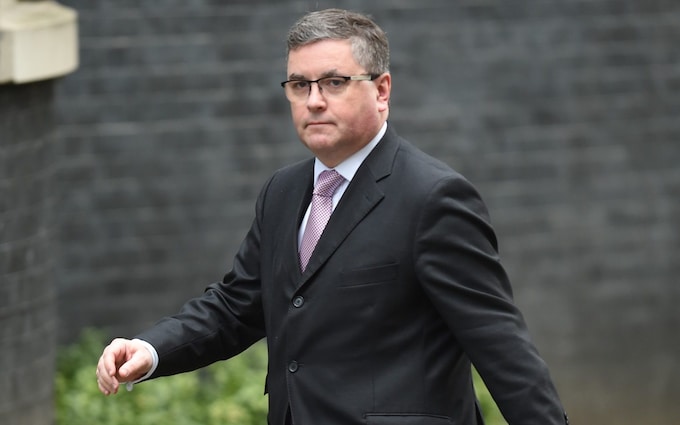
Sir Robert Buckland said those fined by the courts should have their 'slates wiped clean'
Credit: Eddie Mulholland For The Telegraph
The justice secretary who oversaw the courts during the pandemic has called for an amnesty for the more than 29,000 people given criminal convictions for breaking Covid rules.
Sir Robert Buckland said the 29,383 people fined by the courts should have their “slates wiped clean” rather than risk their career prospects being hampered by convictions handed out at an “exceptional time”.
Sir Robert’s call has been backed by two former Cabinet ministers and charities while a source close to Alex Chalk,the current Justice Secretary,said he was also sympathetic to the idea of wiping the slate clean.
Magistrates fined people for breaking Covid restrictions,resulting in criminal convictions that could bar them from working as teachers,social workers or police officers.
Police can pass on these details to potential employers if they are deemed “relevant” for criminal background checks for sensitive jobs where applicants deal with vulnerable people or children.
People are also required to declare any criminal convictions when applying for visas to visit countries like the US and Canada,both of which reserve the right to permanently ban anyone who fails to reveal one.
Offences including attending gatherings,leaving home during lockdowns and failing to wear face coverings resulted in fines,with three quarters of those handed out between 2020 and 2023 going to people under the age of 40.
Sir Robert,who was justice secretary from July 2019 to September 2021,said any background criminal checks should focus on those who might be a threat to public safety,rather than people fined in the “exceptional circumstances” of a pandemic.
He said: “It is not proportionate or necessary at a time when we want to encourage and support as many people back to work as possible. If it is not being recorded in the usual way as a previous conviction,I would wipe the slate clean.”
Sir Robert is among three former Cabinet ministers and charities demanding an amnesty following the Government’s previous assurances that Covid fines were not intended to criminalise large numbers of people.
Sir Jacob Rees-Mogg,the former business secretary,said: “It is time for an amnesty on Covid fines which were an unnecessarily draconian measure at the time but with hindsight look entirely disproportionate.”
Penelope Gibbs,director of charity Transform Justice,said: “The Covid laws were enacted too hastily,poorly drafted and badly explained. So people often broke the law unwittingly and had no right to free legal advice if they were prosecuted.
“Many of those fined now have criminal convictions which could harm their job chances for years to come. We should have an amnesty that wipes the slate clean of all these Covid offences.”
Among those landed with convictions were an 18-year-old student who attended a party during a lockdown,a 35-year-old man who hosted family members on New Year’s Eve and a 72-year-old woman who travelled back from Kenya without evidence of a negative Covid test.
People in their 30s accounted for the largest amount of fines at £6.9 million,although those aged 20 or below paid out £3.3 million. Almost half of the fines,£12.4 million,were raised by just five forces: the Metropolitan Police,Greater Manchester,Merseyside,Lancashire and South Wales.
The court-issued sanctions come on top of at least £8.2 million that people paid after being handed fixed penalty notices (FPNs) by police,an alternative to prosecution.
Those issued by magistrates are deemed criminal convictions and comprise people prosecuted after failing to pay or contesting their initial FPNs. The MoJ says they should not be recorded on the Police National Computer (PNC) and do not result in a criminal record.
Despite this,at least 3,000 Covid convictions have been logged on the PNC,meaning the offender has a criminal record. Police can also hold records of the convictions locally and on the Police National Database (PND),a separate system.
While they are not automatically included in vetting procedures by the Disclosure and Barring Service (DBS),police can include any Covid convictions in “enhanced” DBS checks on applicants for sensitive jobs if they deem them “relevant to the job for which the person is applying”.
The Home Office believes it is unlikely Covid fines would be included on enhanced DBS checks,while an individual could appeal their inclusion to an independent monitor.
It said that if a Covid conviction was included on a check,it would not automatically bar an individual from a specific job and would be considered by the prospective employer.
Sir Charles Walker,chairman of the Commons Administration Committee until Parliament’s dissolution,said it was “incumbent” on the next parliament to come up with a remedy to the potential criminalisation of people who breached the Covid rules. “The idea that anybody with a Covid fine is a serial lawbreaker is utter nonsense,” he said.
“The law was changing almost hourly and it was very difficult for people to keep up with those complex changes. While ignorance is no defence,it was always possible to fall foul of them. It would be ridiculous if it prevented people from travelling overseas on business or on holiday.”
Jo Easton,chief executive of Unlock,a charity that campaigns against the stigma of criminal records,said there was a lack of transparency about police forces’ DBS checks. “It’s a complete black hole. We would like a lot more transparency about what different police forces include and what they don’t,” she said.
Were you or someone you know given a fine that was unfair? Join the debate in the comments below.
© OfficialAffairs